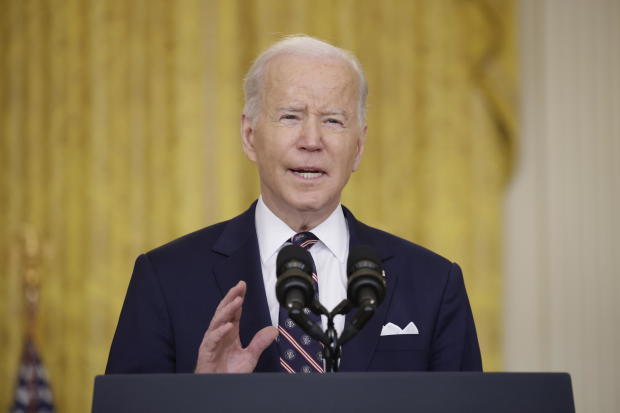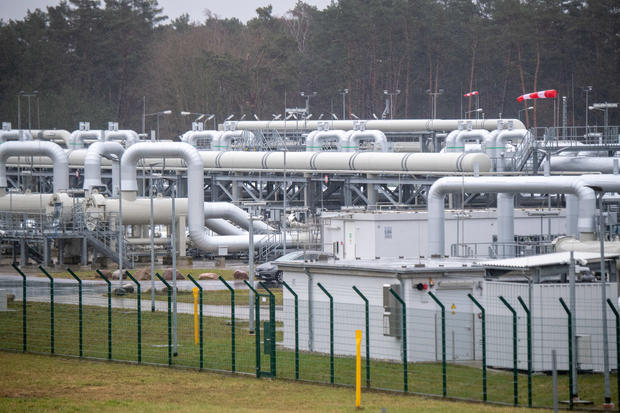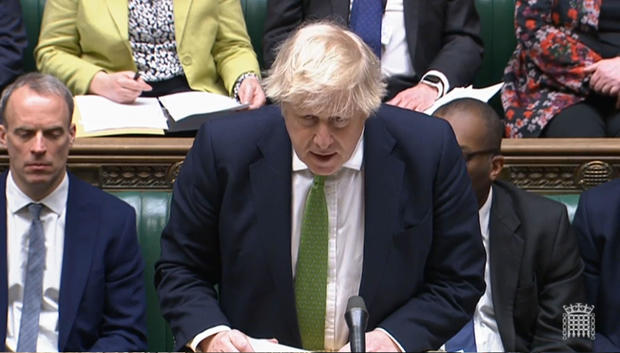Washington — President Biden announced new economic sanctions targeting two key Russian financial institutions and five Russian oligarchs on Tuesday in response to the Kremlin’s escalating aggression against Ukraine, penalties that join measures from Western allies that seek to punish Russia for its latest actions.
“This is the beginning of the Russian invasion of Ukraine,” Mr. Biden said at the White House. “So I’m going to begin to impose sanctions in response, far beyond the steps we implemented in 2014.”
The penalties announced by the president are the “first tranche of sanctions” intended to impose costs on Russia for its latest actions against Ukraine. The president warned that “if Russia goes further with an invasion, we stand prepared to go further as with sanctions.”
Mr. Biden has for weeks warned that an invasion of Ukraine by Russia would spur the U.S. and allies to impose “swift and severe costs” on Russia. The new measures take aim at Russian institutions and individuals close to Russian President Vladimir Putin directly, and seek to impose harsh financial penalties for Russia’s moves to assert control over the separatist Luhansk and Donetsk regions in eastern Ukraine.
Putin’s decision Monday to recognize the breakaway territories as independent and order the deployment of “peacekeeping” forces there led the U.S. to impose an initial round of sanctions targeting the two regions on Monday. Mr. Biden signed an executive order barring new U.S. investment, trade and financing in the rebel-backed regions.
Tuesday’s sanctions come after Germany ceased certification of the Nord Stream 2 pipeline, moving to limit Russia’s future access to European energy markets. The European Union and United Kingdom also announced additional measures taking aim at Russia earlier Tuesday.
New U.S. sanctions target Russian financial system, elites
Samuel Corum/Bloomberg via Getty Images
The new financial penalties from the Biden administration target key Russian institutions, as well as five members of Putin’s inner circle, who Mr. Biden said “share in the corrupt games of the Kremlin policies and should share in the pain as well.”
Specifically, the Biden administration is imposing “full-blocking sanctions” on state-owned VEB and Promsvyazbank, or PSB, along with 42 of their subsidiaries, as well as comprehensive sanctions on Russia’s sovereign debt, a move designed to cut Russia off from Western financing.
The measures against VEB and PSB prevent them from doing business in the U.S. and cut off their access to the U.S. financial system. Assets in the U.S. are immediately frozen, according to the Treasury Department.
The Kremlin-connected oligarchs sanctioned by the Biden administration are: Aleksandr Bortnikov and his son Denis Bortnikov; Sergei Kiriyenko and his son Vladimir Kiriyenko; and Petr Fradkov.
Fradkov is the chairman and CEO of PSB, which primarily focuses on financing Russian defense initiatives. Aleksandr Bortnikov is the head of Russia’s FSB, the country’s security service and successor to the Soviet KGB. He’s also a member of Putin’s national security council. His son, Denis, is the deputy president of a state-owned financial institution, according to the Treasury Department.
Sergei Kiriyenko is Putin’s first deputy chief of staff and the Russian leader’s “domestic policy curator,” according to Treasury. His son Vladimir is the CEO of the parent company that owns Russia’s largest social media platform.
“When all is said and done, we’re going to judge Russia by its actions, not its words,” the president said. “Whatever Russia does next, we’re ready to respond with unity, clarity and conviction.”
The executive order issued by Mr. Biden on Monday barred new investment in the two breakaway regions by any American, as well as the importation and exportation into or from the U.S. of any “goods, services or technology.”
The president’s order also authorized sanctions on any person found to have engaged in set activities in the two separatist-backed regions.
Germany moves to stop certification of Nord Stream 2 pipeline
Stefan Sauer/picture alliance via Getty Images
Mr. Biden’s remarks came after Germany took steps to halt the certification of the Nord Stream 2 pipeline in response to Putin’s latest act of aggression against Ukraine, a significant setback for Russia’s aspirations to exert more leverage over European energy markets.
Owned by Gazprom, Russia’s state-backed energy company, the non-operational pipeline is a multi-billion dollar project designed to double the amount of gas carried from Russia to Germany.
The U.S. has been opposed to Germany using the pipeline, warning it would boost the country’s dependence on Russia for natural gas. Mr. Biden said the U.S. is working with Germany to ensure Nord Stream 2 “will not move forward.”
EU and U.K. sanctions take aim at Russian banks, government officials
Prime Minister Boris Johnson announced Tuesday that the U.K. would be hitting five Russian banks and three oligarchs with economic sanctions. The banks targeted by the U.K.’s sanctions include Rossiya, Black Sea Bank, Genbank, IS Bank and Promsvyazbank. The three wealthy Russians sanctioned by the U.K. are Gennady Timchenko, Boris Rotenberg and Igor Rotenberg.
The oligarchs will have their U.K. assets frozen and are prohibited from traveling to the country.
During an address to the House of Commons, Johnson said the penalties were just the “first tranche, the first barrage, of what we are prepared to do: we will hold further sanction at readiness, to be deployed” with the U.S. and European Union if Russia escalates the crisis in Ukraine further.
House of Commons/PA Images via Getty Images
European Union foreign ministers also agreed to a first package of sanctions in response to Moscow’s recognition of the two breakaway republics in eastern Ukraine, which target individuals and banks, as well as the ability of the Russian state and government to access the EU’s capital and financial markets.
The sanctions specifically hit 27 Russian individuals and entities covering the political, military, business and media sectors, as well as 351 members of Russia’s parliament who voted to recognize the Luhansk and Donetsk regions as independent.
What other sanctions could come
The president warned Tuesday that the U.S. could impose additional penalties if Russia continues escalating the crisis.
“If Russia goes further in this invasion, we stand prepared to go further with sanctions,” Mr. Biden said. The president has warned in the past that the U.S. could sanction Putin himself, a step he did not take Tuesday.
Future measures could take aim at Russia’s access to the broader international financial system, and cut off Russia’s access to technological exports.
The Associated Press reported the U.S. could eventually move to kick Russia out of the SWIFT system, a network used by banks and financial institutions to process transactions around the world. But U.S. officials have been reluctant to take that step, with deputy national security adviser Daleep Singh recently citing “spillover effects” that made kicking Russia out of SWIFT unlikely, at least initially.
“We always will monitor these options, and we’ll revise our judgments as time goes on,” Singh told reporters last Friday.
A U.S. official told CBS News last month that the Biden administration was also weighing controlling exports related to semiconductors, a move that would deprive Russia of key U.S.-made technology.
Download our Free App
For Breaking News & Analysis Download the Free CBS News app


